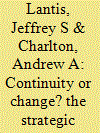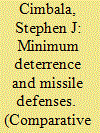| Srl | Item |
| 1 |
ID:
107576


|
|
|
|
|
| Publication |
2011.
|
| Summary/Abstract |
Important puzzles remain in security policy literature, including whether strategic culture can change over time, and if so, under what conditions. This study proposes a model of strategic cultural change that identifies key actors and conditions at work in the process. The article then applies the model to chart the evolution of Australian security policy in the past two decades. We find that structural changes, including geostrategic situation and new security threats, coupled with elite interpretation and discourse, have produced a new "regional defense plus" strategic cultural frame for Australia. This, in turn, has led to measureable changes in defense policy. This work concludes with insights on the implications of change for the broader literature on strategic culture and constructivist security studies.
|
|
|
|
|
|
|
|
|
|
|
|
|
|
|
|
| 2 |
ID:
107581


|
|
|
|
|
| Publication |
2011.
|
| Summary/Abstract |
The economic growth of Eastern states is leading to exceedingly consequential developments for their respective military and civilian space programs. The Chinese space program in particular is developing at a rapid pace, which is commensurate with China's economic growth. Accordingly, if the United States is to retain its quantitative and qualitative edges in space it must recover the dynamism with which to further its economic and technological development. In this regard, inflatable designs for space solar power (SSP) are emerging whose economic impact can power the development of American space capabilities in the twenty-first century. With these platforms the United States can rejoin the space race with immense resources.
|
|
|
|
|
|
|
|
|
|
|
|
|
|
|
|
| 3 |
ID:
107577


|
|
|
|
|
| Publication |
2011.
|
| Summary/Abstract |
The major U.S. allies seem to be content to let the United States shoulder the burden associated with assuring the security of the West and promoting freedom and democracy around the world, passively free riding on the security provided by the U.S. taxpayer. A different explanation is available, if rarely discussed: Perhaps the Europeans great powers are not merely passive consumers of free U.S. security guarantees; perhaps instead the decisions they have made with regard to their own defense are part of active, coherent, logical, rational grand strategies. Perhaps the choice to pursue strategic restraint is not due to the stability provided by U.S. hegemony but a conscious response to declining threat. This article seeks to explain the grand strategies of some of the great and potentially great powers of the post-Cold War world. Far from being irresponsible international actors, our allies are acting quite rationally in a world virtually absent of serious threat, at least compared to all those that have come before.
|
|
|
|
|
|
|
|
|
|
|
|
|
|
|
|
| 4 |
ID:
107578


|
|
|
|
|
| Publication |
2011.
|
| Summary/Abstract |
The French return to NATO has been met with standing ovations in the alliance and perceived as France finally returning to the fold. This article traces the evolution of the French process and suggests that it does not entail a major change in French policy, nor is it taking place at the expense of the European Union's Common Security and Defence Policy. The French have been given central positions within the Command Structure that will enable them to influence NATO's transformation and achieve the ultimate goal of developing a European Union strong enough to be considered an equal partner to the United States.
|
|
|
|
|
|
|
|
|
|
|
|
|
|
|
|
| 5 |
ID:
107580


|
|
|
|
|
| Publication |
2011.
|
| Summary/Abstract |
Understanding human terrain exhibited in historical and cultural attributes offers strategic thinkers a critical but often neglected tool. This article provides a cogent example in Hezbollah with the definition of a distinct identity, the adoption of an Islamist ideology, the designation of strategy to meet tangible objectives, and the manifestation of the tactics used to achieve those specified objectives. The analysis highlights the pertinent role of understanding the activation of identity in future conflict scenarios.
|
|
|
|
|
|
|
|
|
|
|
|
|
|
|
|
| 6 |
ID:
107579


|
|
|
|
|
| Publication |
2011.
|
| Summary/Abstract |
Ratification and entry into force of the New START agreement open the door for possible additional reductions in both states' numbers of deployed long-range nuclear weapons and launchers, but the matrix of post-New START agreement involves nonlinearities with respect to the relationship between minimum deterrence and missile defenses. NATO's Lisbon summit in 2010 invited Russia to participate in a European missile defense system, but Russia is wary of any theaterwide antimissile system that could grow into a more ambitious deterrent-denial force pointed at Russia. Minimum deterrence would drop the numbers of U.S. and Russian strategic nuclear weapons to 1,000 or fewer, but getting Moscow and Washington to move well below 1,000 would require parallel reductions and/or restraints on the part of other nuclear weapons states and a missile defense regime of "cooperative security" rather than mutual suspicion.
|
|
|
|
|
|
|
|
|
|
|
|
|
|
|
|